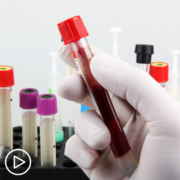Tools for Accessing Personalized Advanced Prostate Cancer Treatment and Care
Tools for Accessing Personalized Advanced Prostate Cancer Treatment and Care from Patient Empowerment Network on Vimeo.
What steps can advanced prostate cancer patients take to help them access the most personalized treatment approach for their disease? This animated video reviews key treatment decision factors, how biomarker testing results affect care, and advice for self-advocacy.
See More From INSIST! Prostate Cancer
Related Resources

What Questions Should Prostate Cancer Patients Ask About Testing and Test Results? |

How Do Biomarker Test Results Impact Prostate Cancer Treatment Options |

|
Transcript:
Every advanced prostate cancer patient is unique AND so is their disease. Advances in research are making personalized medicine a reality, tailoring care and therapy choices based on the genetic makeup and individual characteristics of a patient’s disease.
As prostate cancer research evolves and treatment options expand, it’s vital that patients work with their healthcare team to find the best treatment approach to treat their specific cancer.
An essential step to accessing personalized medicine is biomarker testing, which identifies key markers such as genes, proteins, or other molecules in a sample of tissue, blood, or other bodily fluid. The results of these tests can provide a fuller picture of the prostate cancer’s type, stage, and aggressiveness and may help predict how the cancer will behave.
The test results can also identify which treatment approach may be most effective, through the presence of certain molecular markers. For example, if a tumor has either high microsatellite instability (MSI high) or mismatch repair defects (dMMR), a prostate cancer patient may benefit from immunotherapy. Or a PARP inhibitor therapy may be more effective if the presence of mutations in certain DNA damage repair genes is detected.
In addition to biomarker test results, other factors that physicians consider when recommending a treatment approach include:
- A patient’s age, overall health, and any pre-existing conditions.
- The type, stage, and grade of prostate cancer.
- And, potential side effects or impact on their lifestyle.
- And, the patient’s preference.
Along with these considerations, it’s vital that patients discuss the benefits and drawbacks of each option with their team. So, how can you be proactive in order to access personalized care?
- Ensure that your doctor has experience treating prostate cancer. Consider consulting a specialist or obtaining a second opinion, so you can feel confident in your diagnosis and treatment plan.
- Ask a friend or loved to join you during key discussions with your provider, to help you process the information and to make decisions.
- And, be sure to request all essential testing, including biomarker testing, and ask how the results may affect your prognosis and treatment options.
- Discuss ALL of the treatments available to you, including any potential side effects.
- And ask if there is a clinical trial that could be right for you.
- Finally, and most importantly, YOU should be at the center of your prostate cancer care. Share your opinions and ask questions throughout the process, so you feel empowered and informed.
To learn more about prostate cancer and to access tools for self-advocacy, visit powerfulpatients.org/PC.



